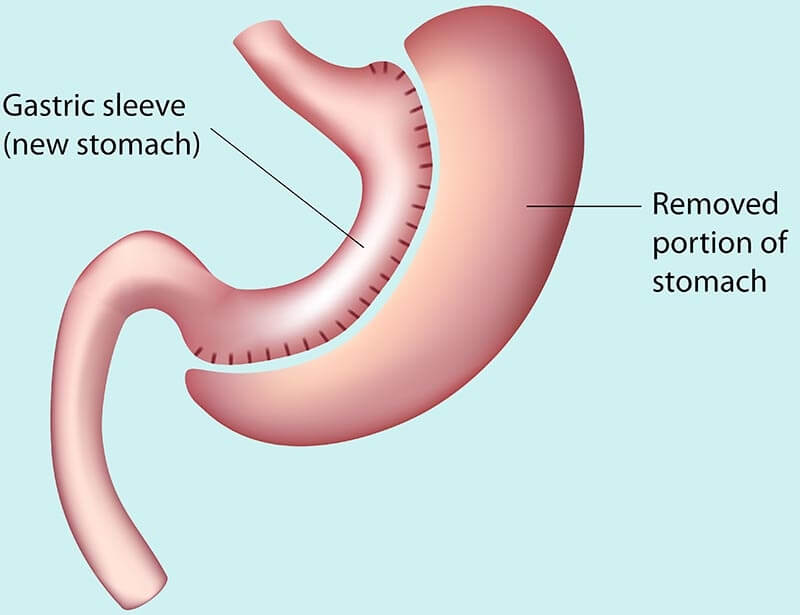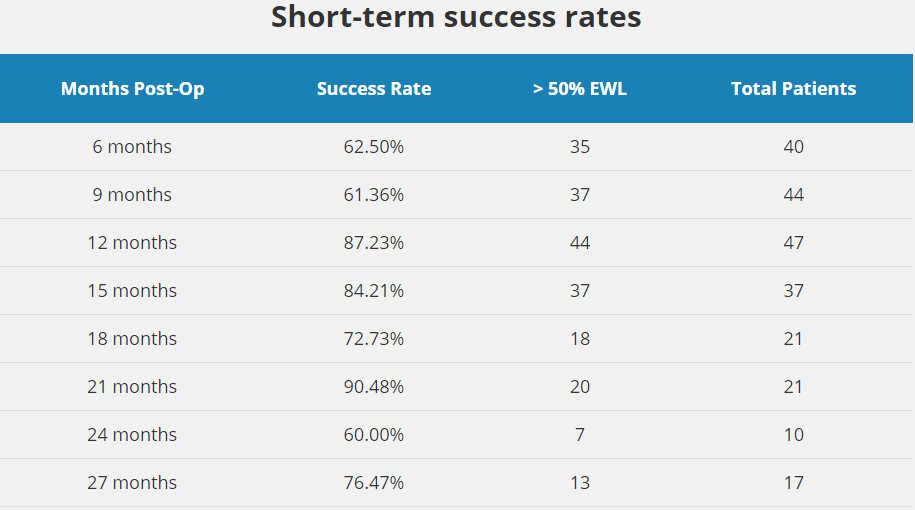A gastric sleeve is an advanced form of weight loss surgery that shrinks your stomach in order to help you shed pounds and modify how your body perceives food.
CUPERTINO, CALIFORNIA | NOW THEN DIGITAL — The success rate of gastric sleeve surgery varies depending on the definition of success and the length of follow-up. According to various sources, the success rate of gastric sleeve surgery ranges from 80% to 96.1%.
Success is typically defined as a percentage of excess weight loss (%EWL) after surgery, with a success rate of %EWL > 50% being commonly used. On average, patients can experience a 50% EWL at around 6 months post-surgery, 60% at one year, and 65% at two years.
The success rate may also be measured by the improvement or remission of obesity-related health conditions, such as diabetes, hypertension, and sleep apnea.

What is a Gastric Sleeve?
Gastric sleeve surgery, a weight-loss procedure also known as sleeve gastrectomy or vertical sleeve gastrectomy (VSG), has been gaining popularity in recent years. This surgery works by restricting food intake, which in turn leads to weight loss.
During the procedure, the majority of the left side of the stomach is removed, leaving behind a narrow tube known as a sleeve. This technique is typically performed laparoscopically with small incisions in the upper abdomen, resulting in reduced scarring and faster recovery times.
Gastric sleeve surgery is considered a viable option for those with severe obesity who have not achieved long-term success with other weight loss methods. Additionally, the procedure may also improve or even resolve conditions such as heart disease, high blood pressure, and high cholesterol, all of which are associated with being overweight.
Given its potential to positively impact individuals with severe obesity and related health conditions, gastric sleeve surgery is gaining traction as a promising solution to address the obesity epidemic.
Who Can Benefit From a Gastric Sleeve?
Candidates for this procedure include people who are severely obese and suffer from health conditions like diabetes, high blood pressure or sleep apnea that could be improved through weight loss. They must have a BMI of 35 or greater and be willing to make long-term lifestyle modifications after the procedure.
What Is the Success Rate of Gastric Sleeve Surgery?

The success rate of gastric sleeve surgery varies depending on the definition of success and the length of follow-up.
A recent prospective study, published in the National Center for Biotechnology Information (NCBI), revealed promising results regarding the success rate of gastric sleeve surgery. The study evaluated the percentage of excess weight loss (%EWL) achieved by patients post-surgery over a period of five years.
The findings indicate a high success rate, with a staggering 96.1% of patients achieving %EWL greater than 50% after one year. This figure remained impressive at 95.1% after two years, and 89.5% after three years, respectively. The study also observed a gradual decline in success rates as time progressed, with 82.1% and 77.4% of patients achieving %EWL greater than 50% after four and five years, respectively.
These results signify the efficacy of gastric sleeve surgery in producing significant weight loss outcomes in the short and long term. Further research is required to assess the long-term sustainability of these outcomes and the potential impact on patient quality of life.
Another source, Barilife, reports that patients can experience an average of 50% EWL at around six months post-surgery, 60% at one year, and 65% at two years. Mexico Bariatric Center reports that the average success rate after five years is 73%, and the vertical sleeve gastrectomy is steady between 51% and 55% after ten years.
Beltre Bariatrics reports that the gastric sleeve success rate is approximately 80-90%, and people experience excess weight loss of about 60-70% within one year of surgery. UCLA Health reports that the gastric sleeve success rate is approximately 80-90%, and most people reach their lowest weight 12-24 months after surgery.
What Are the Side Effects of a Gastric Sleeve?
The most common effect is feeling full faster and not eating as much food as before, due to a smaller stomach providing less space for food intake and lower levels of ghrelin (the hormone responsible for hunger).
With smaller stomachs comes less room for food to enter your system and less ghrelin production by your body – leading to decreased hunger cravings.
What Happens if I Lose Weight After Gastric Sleeve?
On average, patients lose between 50-70% of their excess weight within two years after having a gastric sleeve. To maintain this loss of energy and motivation to exercise regularly, you need to follow an appropriate diet and maintain your fitness level.
Slimming through surgery is one of the most popular and successful weight loss options. For many patients, this procedure has the potential to provide a life-altering experience by decreasing the risk of obesity-related diseases like high blood pressure, diabetes and osteoarthritis.
What is the Gastric Sleeve Procedure?
Gastric Sleeve Procedure
A surgical weight loss technique that permanently shrinks the size of one’s stomach, restricting how much food one can eat. This reduces hunger and promotes fullness. Furthermore, it decreases production of certain hormones that lead to overeating.
How Is Gastric Sleeve Surgery Performed?
In a typical gastric sleeve surgery, your surgeon makes several small incisions in your abdomen and inserts a laparoscope–a lighted video camera–to remove part of your stomach before stitching together the remaining portion to form a sleeve. The remainder is stitched back together for secure closure.
The newly smaller stomach allows people to consume food more quickly, leading them to feel full sooner. Furthermore, this reduced size helps the body absorb essential nutrients more effectively.
How Much Will I Lose?
In the first two years after surgery, most people who have had gastric sleeve can expect to shed 25-30% of their excess weight. But if you don’t adhere to a healthy eating and exercise routine, some of that lost weight may return.
After Surgery
Following gastric sleeve surgery, you will have to drastically alter your diet and lifestyle. Eat only small portions of nutrient-dense foods and ensure you drink enough fluids; additionally, learn how to properly move your bowels – this may take some practice at first so that regular meals can resume again.
Gastric Sleeve Risks
Though gastric sleeve surgery is generally safe and often leads to weight loss, there are some potential risks that should be considered. These may include physical, medical and emotional health issues which may develop over time or be connected with what type of diet you follow after surgery.
Nausea is a common side effect of this surgery, though it can improve with time and medication treatment. Some individuals also experience stomach pain and difficulty swallowing.
Suture line leaks are another potential complication that could occur during or after surgery. This occurs when stomach content escapes through a spot sewn together during surgery.
Nutritional deficiencies can also be an issue after this surgery, as it’s difficult for those who have this surgery to get enough of certain vitamins and minerals. Your doctor will likely provide daily nutritional supplements during your recovery period as well as for life afterward.
Hernias are relatively uncommon after sleeve gastrectomy compared to other bariatric surgeries, though they can occur. If this occurs, your surgeon may need to perform another operation in order to repair the hernia.
Damage to other organs in the abdomen is also possible, though this is highly unlikely with a qualified surgeon. However, it could occur and require additional surgery for correction.
Gallstones can become an issue, particularly for people who rapidly shed pounds. These obstructions to digestion and health should never be overlooked. In the United States, approximately 10–15% of the adult population has gallstones.
Gastric Sleeve Complications
There can be both short- and long-term risks associated with the gastric sleeve procedure. While these complications are rare, it’s wise to discuss them with your doctor prior to surgery.
Some people can develop a blood clot in their sleeve, which can be life-threatening. If this occurs to you, open surgery may be necessary to remove the clot and resolve your health issue.
Adhesions
Adhesions occur when your internal tissues bind together due to prior abdominal surgery or illness, making it difficult for the surgeon to view and work on the affected area.
Adhesions can also be caused by a poor diet or lack of exercise. If you find that adhesions are becoming an issue for you, consider getting a stomach bypass or gastric balloon instead.
GERD (Gastroesophageal Reflux Disease)
Between 2%-21% of those who undergo the gastric sleeve procedure will develop GERD; it can be treated with antacids or proton pump inhibitors. Symptoms typically improve within one to two years after surgery but may return after one to two more.
Gallstones
Rapid weight loss may cause fatty deposits to build up in your gallbladder, increasing the likelihood that you will develop gallstones. If you have a history of gallstones or are at high risk for them, discuss with your doctor the possibility of having an operation called a cholecystectomy.
Post-Operative Diet
Following surgery, it’s essential to maintain your diet for success and recovery. Avoid foods high in fat or sugar; limit liquids; and adhere to the guidelines provided by your healthcare team when it comes to eating solid foods.
Gastric Sleeve Benefits
The gastric sleeve is a surgical procedure designed to help individuals reduce weight. It has proven successful in combatting obesity and improving conditions like type 2 diabetes, high blood pressure, and sleep apnea.
Weight Loss – On average, people who undergo gastric sleeve surgery will lose 60-70% of their excess weight within 12-18 months. This can dramatically improve their health and quality of life.
Obesity – The procedure may benefit those with severe obesity, defined by a body mass index (BMI) of 40 or higher. This is because the operation reduces caloric intake, leading to weight loss.
Hirsutism – Sleeve operations have been shown to be effective in improving hirsutism among overweight women and may even increase fertility, particularly for those struggling to conceive.
Reduction in Cancer Risk – Sleeve gastrectomy can reduce stomach acid production, potentially decreasing your chances of developing certain types of stomach cancer.
Improvement of Snoring – For many people, the sleeve gastrectomy helps alleviate snoring and obstructive sleep apnea. This is essential since sleeping apnea can cause fatigue and decreased concentration, ultimately decreasing your quality of life.
Sleeve surgery may make it easier to absorb certain nutrients and prevent heartburn or reflux. However, if you experience any of these issues, consult your doctor prior to undergoing the procedure.
How Much Is Gastric Sleeve Surgery?

The cost of gastric sleeve surgery varies considerably based on doctor and location. Areas with higher healthcare expenses or lower insurance rates may charge more for this procedure.
Most often, your health insurance provider will cover the cost of bariatric surgery if it is medically necessary for weight loss. However, the amount covered varies between plans.
Prior to your surgery, you may need to cover some pre-op tests and lab work. This depends on your health insurance policy and what your doctor recommends.
Your surgeon will also suggest a diet that is suitable for you both before and after your procedure. Eating properly before and after surgery will ensure the most beneficial outcomes from the experience.
The sleeve will reduce your stomach size, helping you eat less food. But in order to sustain the benefits of surgery and maintain your new healthier weight, you must commit to changing your lifestyle afterwards.
After one month, you can start eating regular, nutritious food again. Just remember to ensure that you continue drinking plenty of water during this period!
Once your sleeve has been removed, you may experience some mild discomfort and mild pain as the anesthesia wears off. This is completely normal and will subside quickly.
Recovery is the beginning of your journey towards a healthier you and an enriching life. It may take some time, but once you can eat properly again, your body will start to adjust to its new smaller size.
Celebrities Who Had Gastric Sleeve Surgery
Celebrities have been known to opt for gastric sleeve surgery as a solution to their weight problems, helping them shed pounds and maintain the results.
Celebrities who have undergone gastric sleeve operations have reported significant weight loss and managed to maintain it by following a healthy diet. Furthermore, those individuals are known for being highly active individuals who strive to remain fit and healthy.
Graham Elliot
British singer, comedian and television presenter Graham Elliot underwent gastric sleeve surgery in 2013 to shed pounds – and has maintained his results ever since. Thanks to this surgery, Graham can live a normal life while enjoying all of the foods he loves – with no restrictions!
Star Jones
American TV host and actress Star Jones struggled with her weight for many years; at 450 pounds when she underwent surgery, Star was 170 pounds.
Through proper nutrition and regular exercise, Star has maintained her ideal weight of 170 pounds while combatting any health issues caused by weight loss. She’s delighted with how well-tolerated the results have been since surgery!
Mariah Carey
The famous singer has always had curves that are not visible to the naked eye, but when she started getting body-shaming comments she decided to have surgery in order to change her look. Through gastric sleeve surgery, Mariah has managed to shed pounds and says that she never wants to gain them back due to all the positive changes it’s brought about since.
Gastric Sleeve Vs Gastric Bypass
Bariatric surgery is a surgical solution that helps you shed pounds. If you’ve tried dieting and exercising without success, or your obesity is linked to other health conditions like high blood pressure, sleep apnea, or diabetes, bariatric surgery could be your ideal solution.
What type of bariatric surgery you select depends on a number of factors, including your health and desired outcomes. The two most popular procedures are gastric sleeve and bypass; however, other options may be available depending on individual requirements.
Gastric sleeve is a minimally invasive surgery that creates a small stomach pouch. Surgeons take out approximately 80% of your stomach, sewing it together into what appears to be a banana-shaped pocket.
Your surgeon then reconnects the lower portion of your small intestine to a newly created stomach pouch, redirecting food and causing the body to absorb fewer calories. This reduces appetite and helps you feel full more quickly after meals.
Gastric bypass, in contrast, redirects your stomach to a different location within your small intestine. It leaves part of your small intestine dormant and restricts nutrient absorption – necessitating you to take supplements for this condition.
Both surgeries are safe and offer excellent long-term weight loss results if you adhere to the recommended diet and exercise program. On average, both procedures result in about 70% of excess body weight being lost within 12-18 months after surgery; however, individual results may vary greatly if healthy lifestyle changes are made after the procedure.
Gastric Sleeve Vs Duodenal Switch
Gastric Sleeve and Duodenal switch are bariatric procedures designed to help patients lose excess weight. Both methods reduce appetite by inhibiting ghrelin production – the hunger hormone.
Gastric sleeve (also known as vertical sleeve gastrectomy) is the most popular and successful procedure for those looking to shed significant amounts of weight. This involves extracting part of your stomach and rerouting intestines so that only small amounts of food can be digested at once.
Conversely, duodenal switch surgery (also referred to as biliopancreatic diversion with duodenal switch or BPD/DS) combines the gastric sleeve and bowel bypass components of a typical gastrointestinal bypass. It is an ideal procedure for those suffering from severe morbid obesity (body mass index of 50 or higher).
Comparing to sleeve gastrectomy, duodenal switch can result in significantly greater weight loss and type 2 diabetes remission rates of up to 98%. It also requires lifelong dietary modifications to ensure your body gets enough vitamins and minerals.
Before scheduling an appointment for duodenal switch surgery, it is wise to discuss your goals and expectations with your surgeon. They can explain the differences between both surgeries and help you decide which is most suitable for you.
Duodenal switch surgery can be performed on adults who have a BMI over 50 and suffer from obesity-related health conditions like high blood pressure or elevated cholesterol levels. This surgery utilizes both restrictive and malabsorptive components that have been scientifically proven to be successful for weight loss.
What You Should Know About the Gastric Sleeve Diet
Are you struggling to shed pounds? A gastric sleeve surgery could be your ideal solution. Not only does it help you shed excess weight, but it also regulates your appetite.
A gastric sleeve surgery helps you lose 30 to 50 percent of your excess weight in the first six months, and 77 percent of excess weight as early as 12 months after surgery.
How it Works
This type of surgery differs from other bariatric surgeries in that your stomach will be smaller. This allows you to eat less food at one sitting and feel full faster.
Prior to your surgery, you’ll need to follow a strict diet in order for your liver to shrink in size. This is essential for both safety and the success of the operation.
After your surgery, you must adhere to a liquid diet for two weeks. Drink small sips of clear fluids (like water, black tea or coffee, and diluted no-added-sugar cordial) every hour in order to stay hydrated.
You’ll also be provided with a list of foods to eat that are easily digestible and help your body adjust to the new stomach pouch. Once you feel ready, you can begin adding solid food back into your diet.
The most essential element of this diet is eating regularly and in appropriate portions. Doing so will help you maintain a healthy weight over the long run.
After your surgery, you should also take a bariatric multivitamin and mineral supplement. These will help keep you healthy, prevent weak bones and other health issues.
Editor’s Note: If you find any of our content to be inaccurate or outdated, please contact us at press@nowthendigital.com
You’re reading nowthendigital.com — which breaks the news about Uganda, Kenya, Nigeria, South Africa and the rest of the world, day after day. Be sure to check out our homepage for all the latest news, and follow NOW THEN DIGITAL on YouTube, Google, Web Stories, Google News, Medium, LinkedIn, Twitter, Reddit, Pinterest, Linktr, Buy Me a Coffee, and Flipboard to stay in the loop.













